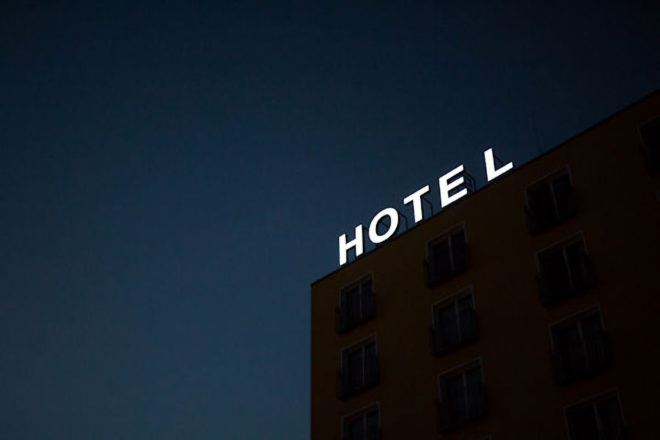Hotel Website Accessibility Could Be Stifling Your Bookings
 Website accessibility is a buzzword in website designer and developer circles these days. It’s an important part of your hotel website and can improve your website conversions and reservations.
Website accessibility is a buzzword in website designer and developer circles these days. It’s an important part of your hotel website and can improve your website conversions and reservations.
Ask yourself if your website is accessible to all. How is your overall user experience for every visitor? In this article, we look at how website accessibility could be stifling your bookings.
First, though, let’s define hotel website accessibility.
What is Website Accessibility?
When you talk about accessibility in relation to your hotel website, this means how well your site is equipped for people who have physical or mental disabilities.
For example, if someone is blind, can they view your website? What about someone who is deaf or has cerebral palsy? What if they have dyslexia or motor control disorders?
If your website is accessible, anyone can easily access it. Your online content, visual and auditory, can be read and heard by anyone, regardless of disability. (tweet this)
What are the Benefits of an Accessible Website?
By making your site more accessible, you’ll most likely improve your conversion rate.
Why? This is because more people can use your website and make a reservation at your hotel.
In addition, you build customer loyalty because all your website visitors can see you care about all your current and potential customers.
Why Should You Worry About Website Accessibility?
For starters, you want to be a good steward of your hotel, which means making it open and available to people who are blind, have low vision, are deaf or hard of hearing, or have cognitive disabilities or mobility impairments.
Next, you want to make sure you aren’t excluding anyone from accessing your hotel website. You don’t want to violate the Americans with Disabilities Act (ADA).
The ADA is a federal act that prohibits businesses from discriminating against people with any type of disability. So, when you adhere to the ADA, you are staying compliant with federal law.

How Do I Make My Website More Accessible?
You can use a variety of techniques. For example, you might use captions on images or provide transcripts of videos and audio. You can also offer options so people with low vision can make your fonts larger on their own.
Best practices dictate that you should provide alt text on all your images. This is actually helpful for all users. When you add images in the back end of your website, always complete the alt text. This way, people who have images turned off, or those who can’t see can read or listen to the alt text. (tweet this)
You’d also pay attention to colors and perhaps avoid flashing videos or images for people who have photosensitivity.
Really, the options are endless. You simply want to start somewhere to make your website accessible to all.
The first place to look is the website of the World Wide Web Consortium (W3C), where they have developed guidelines for website accessibility.
These are standards that all web designers, website developers, and business owners like you can refer to when creating your hotel website and your website content.
By using this guide, you’ll find it’s easy to make these changes and updates to your hotel website.
You’ll reap the benefits of opening your website to many more people.
What are the Requirements for Website Accessibility?
You’ll find there are four accessibility standards and principles as you work on revising your website.
Here’s a brief overview, but be sure and refer to the details guidelines.
- Your website should be perceivable by all. This means everyone should be able to perceive it, and nothing should be invisible to their senses. This means providing text alternatives for non-text content, captions, and alternatives to multi-media. Consider presenting your content in multiple ways so people using assistive technologies can grasp it. Overall, you want to make it easier for website visitors to see and hear your content.
- Your website should be operable. This refers mostly to your site navigation. You want everyone to be able to access your menu from a keyboard. It also means making sure your website doesn’t cause problems for seizure-prone people. You also want to ensure people can navigate your site easily and find what they’re looking for.
- Your hotel website should be understandable. You want text that is readable and understandable by all. You want users to be able to find content in a predictable way.
- Finally, make sure your hotel website is robust. This means you want a wide variety of people to be able to access your site, even those using assistive technologies. Keep your future users in mind as you design and refresh your website.
The bottom line is ensuring anyone visiting your website can hear and see all the content in the best way for them.
Steps to Accessibility
We’ve touched on accessibility features, but here is a complete list of what you can optimize on your hotel website.
- Website headings should follow a hierarchical structure. This means using main headings and sub-headings. This way, screen readers can parse the content for users appropriately.
- Use alt text on all images, including infographics.
- When it comes to links, really spell out what and why your users should “click here.” Use more text to explain it.
- When it comes to your hotel website forms and booking engine, make sure you specify exactly what you’re looking for. Instead of a phone, say cell phone. Instead of name, say first or last name.
- Think about color. Some people will have a problem distinguishing certain colors. Do a little research to find what will work best for you.
- Concentrate on the user experience. Your navigation should be easy for anyone to understand. You also want it to be accessible for users who are only using a keyboard and their tab and arrow keys. Make sure your navigation is intuitive.
- When it comes to bookings, make sure your website visitors can access your reservation form in multiple ways.
Final Thoughts
One of the benefits of concentrating on hotel website accessibility is that when you do this, your website will most likely be easier to navigate for everyone. This means both your disabled and non-disabled users will have a better overall experience.
When your website is accessible, you’ll not only attract more website visitors, but you’ll increase your bookings in the process.
You will also increase your website traffic, encouraging more visitors than your competition’s website.
In addition, everyone will find a better hotel website experience, and you’ll build goodwill and customer loyalty.
Ultimately, you won’t stifle your bookings because your hotel website is perfectly accessible to everyone.
We are your hotel’s digital advertising specialists and can help you position your hotel for success and attract guests to your inn. As experts in website design, we can create a new website accessible to all, one that anyone can easily access. And we can also help with search engine marketing, online booking, online listings, and social media marketing, we are here to help. Contact us today to start a conversation about your digital advertising needs.
Images: Marten Bjork and Manuel Moreno on Unsplash
Free Hotel Website Checklist
5 Essential tips for using your website to book more guests! Plus, a Free email course, Winning Web Strategies For Innkeepers.